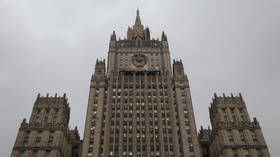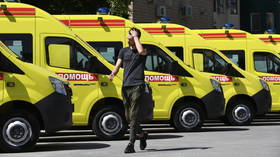'Fraught with consequences for Russian-German relations’: Moscow furious with Berlin over lack of cooperation on Navalny

Russia's Foreign Ministry has issued a statement warning Germany and its allies within NATO and the EU will be held responsible for Berlin’s actions in relation to the alleged poisoning of Russian opposition figure Alexey Navalny.
The extraordinary intervention arrived after Germany’s ambassador to Moscow was summoned to lodge a protest over what the Ministry called Berlin’s attempts to discredit Russia on the world stage following the alleged poisoning of the Russian opposition figure.
The comments came on a tumultuous Wednesday, in which Foreign Minister Sergey Lavrov also blasted the Germans for snubbing Russian inquiries about the condition of the anti-corruption activist.
“A strong protest was declared to the ambassador over the unfounded accusations presented by the government of Germany against Russia in the context of the illness and hospitalization of Russian citizen Alexey Navalny, and the obvious use of his situation by Berlin as an excuse to discredit our country on the international arena,” the statement from the Russian Foreign Ministry read.
“The German government and its allies within NATO and the European Union will bear full responsibility for the consequences of such policy.”
Russian diplomats demanded that Germany provide a detailed answer to the official request of the Russian Prosecutor General’s Office dated August 27, 2020, asking Berlin to provide details on Navalny’s treatment, diagnosis and test results, and to present a copy of the patient’s medical records and biological materials for comparative research.
If Berlin does not respond to Russia’s request, Russia will consider it a “blatant hostile provocation" and “the German government’s refusal to help establish the truth through an impartial investigation." This would be “fraught with consequences for Russian-German relations” and may complicate the international situation, the ministry stated.
German Ambassador to Russia Geza Andreas von Geyr stated during the meeting that Navalny’s case is not an issue for only Germany and Russia, preferring to invoke Berlin's international alliances. “During the talks with the First Deputy Foreign Minister, Ambassador von Geyr stressed once again that this case is not a matter of the bilateral German-Russian agenda. He cited statements made by the EU, NATO, the G7, and many other states,” a message from the embassy given to Moscow news agency TASS stated.
Also on rt.com G7 foreign ministers slam what they refer to as ‘confirmed poisoning’ of Russian opposition figure Navalny ‘in strongest terms’Earlier in the day, Lavrov said Berlin recently refused to share information on the chemical analysis conducted by German military toxicologists, in order to prevent Russia from realizing “the extent of knowledge that the German military possesses in the sphere of chemical substances.”
“Of course, we have amassed quite a few questions for our German colleagues regarding the absolutely inappropriate attitude to those official inquiries that we have sent to Berlin, including an official inquiry from the Prosecutor General’s Office to render legal assistance according to an agreement between our countries,” he noted.
“We are not satisfied with the essence of the reaction to our authorized, legal, and well-founded requirements to fulfill obligations under intergovernmental agreements on legal assistance, nor are we satisfied with the absolutely unacceptable tone in which the German position is being communicated to the world community.”
According to Lavrov, for a long time Germany has ignored Russia’s inquiries – and Moscow’s repeated requests have all received replies along the lines of “You know everything already and you should be held responsible for everything.”
Moscow has repeatedly criticized Germany over what it called dragging its feet on the alleged poisoning probe and failing to respond to Russian officials’ requests filed back in August. Berlin responded by saying all the necessary approvals for the requests were granted but the data could not be passed over to the Russian side because the investigation was still ongoing.
Relations between Moscow and Berlin soured after Germany’s Foreign Minister Heiko Maas said that his nation has “a lot of evidence” that the Russian state was behind the poisoning of the opposition figure. Maas also mulled imposing new sanctions against Moscow over the incident, hinting that they could even affect the Nord Stream 2 – a major gas pipeline project, in which both European and Russian companies are involved.
Also on rt.com German FM links Nord Stream 2 to Navalny, threatens sanctions as Moscow accuses Berlin of dragging feet on alleged poisoning probeGermany’s Western allies immediately rallied around Berlin and expressed their own “concerns” over Navalny’s poisoning. London summoned the Russian ambassador over the issue and the G7 nations issued a damning statement condemning the attack on Navalny while just stopping short of openly blaming it on Moscow.
Russia responded by blasting the very idea of sanctions as “absurd” while stating, at the same time, that it is ready to cooperate with Germany on the probe into the incident.
Russian opposition figure Navalny was rushed to a local hospital in the Siberian city of Omsk on August 20 after collapsing on a Tomsk-Moscow flight. He fell into a coma and was hooked up to a ventilator in the intensive care unit. On August 22, he was airlifted to the Charite hospital in Berlin.
The German government later claimed that, having examined Navalny’s test samples, the Bundeswehr’s [German military] toxicologists had come to the conclusion that the blogger had been affected by a toxic agent of the Novichok family. Berlin called on Moscow to clarify the circumstances of the incident, adding that it would consider potential sanctions in relation to the incident.
Russia stated that it was interested in investigating what had happened to Navalny. Nevertheless, according to the Russian Foreign Ministry, Berlin has not yet presented any proof of its version of the incident.
On Monday, the Berlin clinic announced that Navalny is no longer comatose and that he has been taken off artificial ventilation.
Think your friends would be interested? Share this story!













